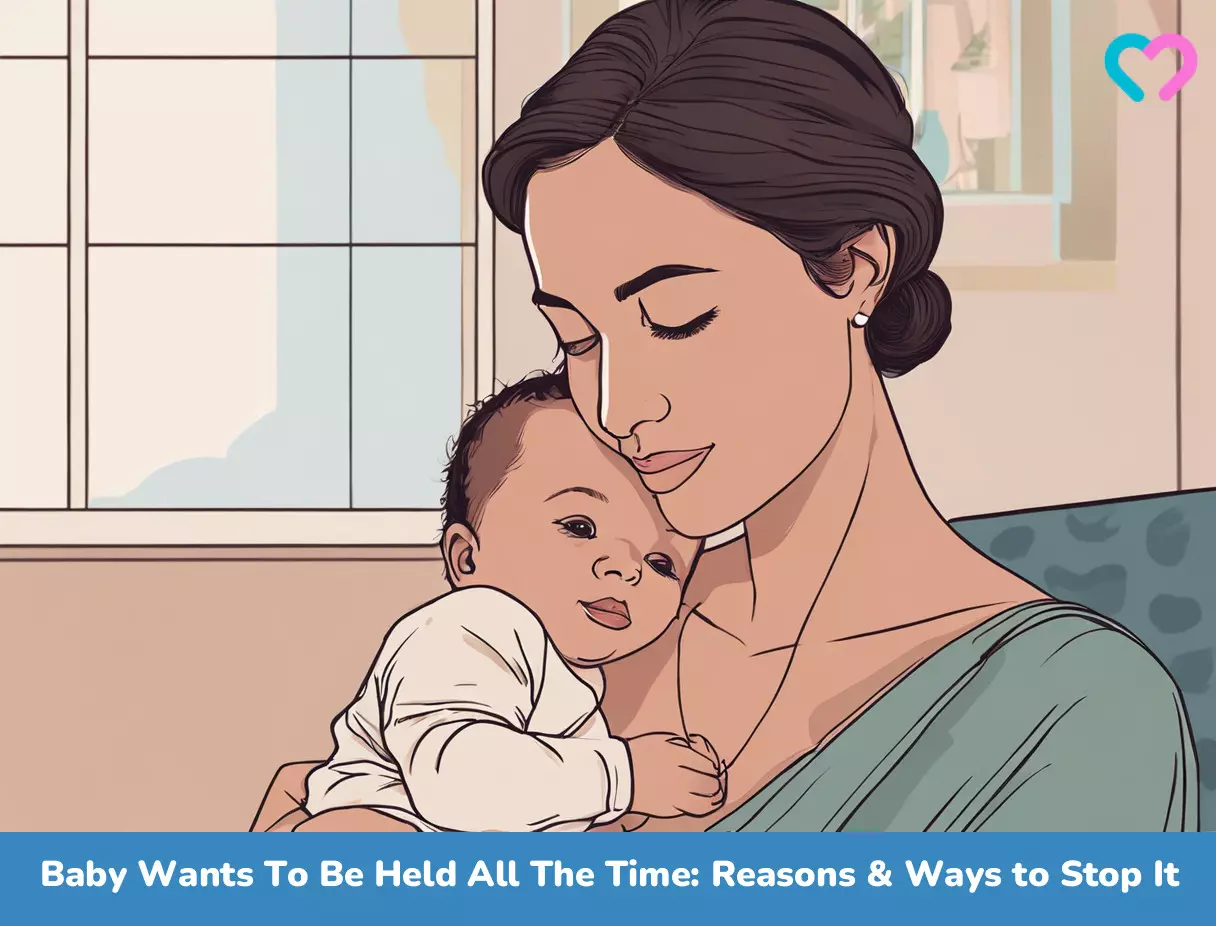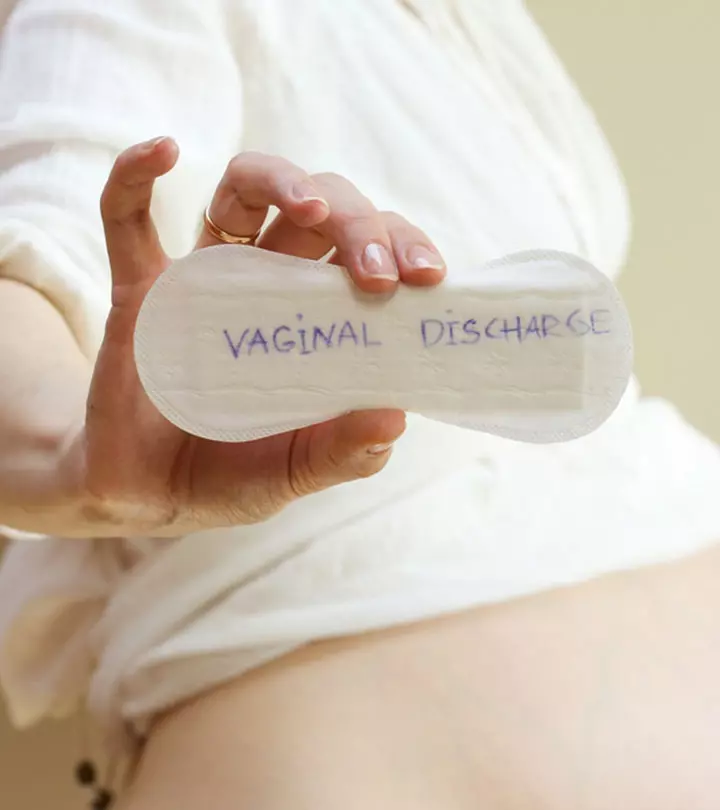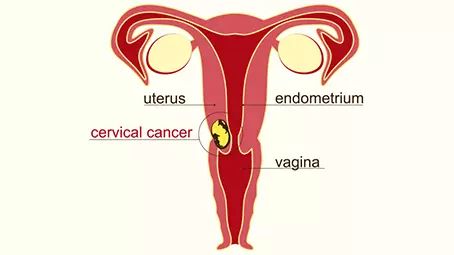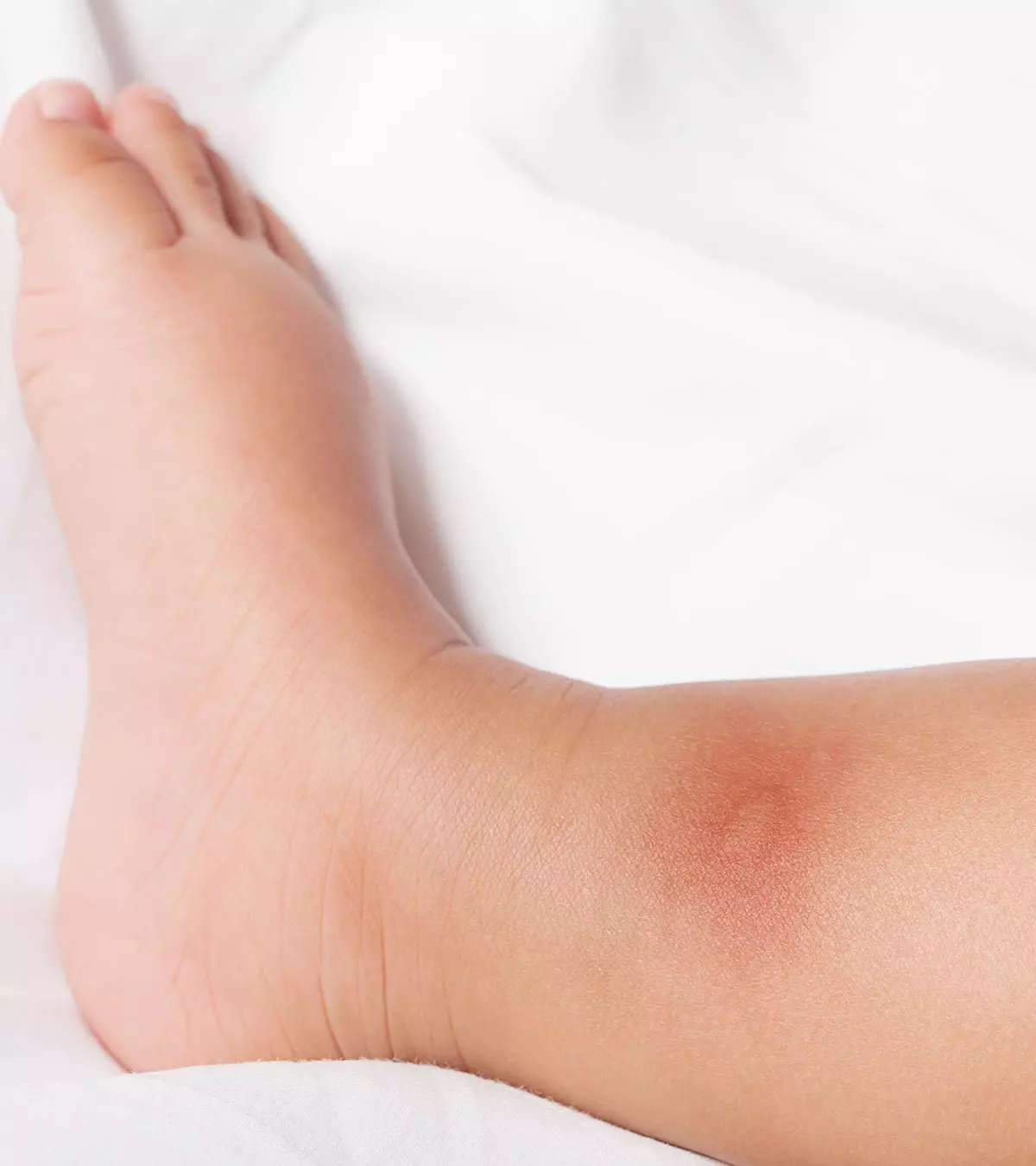
Image: ShutterStock

It is no secret that babies love to be cuddled and held. Everything is new for the baby, so being held close to the parent can give them a sense of comfort and security. But if a baby wants to be held all the time and gets fussy if not held, then it may be concerning for later years. Holding the baby in your arms is usually the only way to move them around until they are old enough to sit in a carrier or stroller. However, it can be inconvenient for you if they continue to demand to be held even when they grow into toddlers. If you are worried about why your baby wants to be held constantly, read on to know more about it. From developmental issues to indicating insecurity in babies, there are many reasons parents may ponder upon their baby’s clingy behavior. Therefore, knowing the exact cause can help alleviate these concerns. We have also shared the advantages of holding the baby and when to stop it.
Key Pointers
- Babies may want to be cuddled by their parents for comfort, sickness, or separation anxiety.
- Newborns may benefit from cuddling and skin-to-skin contact with their parents to regulate their temperature, pulse, and breathing.
- Holding your infant frequently can help you develop better breastfeeding postures.
- If your 3-year-old toddler still prefers to be carried rather than communicate their thoughts, see a doctor.
Why Do Babies Want To Be Held All The Time?
There could be several reasons why a baby cries when put down or prefers to be held, depending on their age, health status, and personality. Below are some of the common reasons why babies may like to be held by parents all the time.
1. Comfort and security
A newborn is suddenly thrown into a noisy world from the calm and warm womb. Therefore, they instinctively desire touch by being held by parents, especially their mother. Babies who are just born can calm down and cry less when held close by the mother (1).
The comfort and security provided when being held resemble the womb’s environment. Furthermore, when you hug or embrace a baby, it has a soothing effect on them. It is also believed that babies may calm down on hearing the mother’s heartbeat since they would be familiar with it (2). Babies may also recognize the scent of their mother, calming them down easily. In a study from the University of Padova, researchers looked at the heart rates of 30 newborns to see how their bodies responded to different types of touch. They found that when the babies were touched in a non-soothing way, like tapping, their heart rates became more irregular, showing signs of stress. However, when the babies were gently stroked in a soothing way, their heart rates stayed steady, suggesting that comforting touch helps them stay calm (3).
2. Sensory processing
Sometimes, a baby’s clingy behavior could be due to poor sensory behavior, affecting their brain to receive and respond to sensory information. Being close to a parent or a caregiver makes them feel secure in the new environment. However, as your baby’s sensory processing matures, the baby might become comfortable to be apart from their caregiver.
3. Illness and hunger

A baby who is unwell might demand to be held more often and may even have a strong desire to snuggle. In such cases, you are likely to notice other signs of illness, such as fever and loss of appetite. Holding the baby close may help ease the discomfort caused by the illness. Research shows that when infants are cradled, they instinctively nestle into their caregiver’s neck and adjust to their body. This position not only soothes the baby but also fosters a connection between them and their caregiver (4).
Some babies may even demand to be held for frequent breastfeeding when hungry. It may likely be the case when they are experiencing growth spurts. A baby may also demand to be held and breastfed when thirsty. In such scenarios, look for other hunger indicators or baby hunger cues, such as placing thumbs in the mouth or moving their lips.
4. Separation anxiety and tantrums
Separation anxiety occurs when babies assume that when parents go out of sight, they leave forever. This feeling peaks between the ages of 10 and 18 months, and is usually gone by the age of three years (5). Babies who experience separation anxiety may demand being held when they see the parent and may not allow the parent to leave.
Toddlers may demand being held when they have a tantrum episode. For instance, if they are upset about a sibling taking their toy, they may demand being held and comforted by the parent. Some toddlers may only throw tantrums at a specific time, such as tantrums before bedtime. Toddlers may experience a sense of reward from parents’ attention during such situations (6).
 Did you know?
Did you know?What Are The Advantages Of Holding Your Baby?
Holding a baby, especially newborns, could provide the following benefits to the parent and the little one (1) (7) (8).
- Cuddling and skin-to-skin contact with a parent could help a newborn regulate their body temperature, heartbeat, and breathing.
- It can calm down an anxious and cranky baby, reducing any emotional distress.
- Some babies may sleep better when held before bedtime.
- Unwell babies may show improvement in minor symptoms, such as colic, due to an illness.
- It may help make chronic pain, such as teething pain, tolerable for a baby.
- It can help nurture a healthy bond between parent and baby, where the baby promptly reaches out to a parent when experiencing discomfort.

- Research indicates that being held and cuddled could have therapeutic value since it may stimulate brain and body development in some babies.
- Mothers may notice they establish breastfeeding better when they hold their newborn often.
- Cuddling with the baby could help the mother relax, and it may improve her postpartum recovery.
- Holding the baby could be a great way for fathers, siblings, and other family members to bond with the baby.
 Research finds
Research findsWould The Baby Become Clingy?
Experts believe that holding your baby often, especially when they need comfort and reassurance, is unlikely to make them clingy (9). Most babies cry and want to be held because they have a certain need, which can only be fulfilled by parents. In most cases, the baby will stop demanding to be held once the need is fulfilled. You are usually unlikely to spoil the baby by holding them all the time. However, the age of the baby could also play a role in the matter.
 Quick fact
Quick factWhen To Be Concerned?
While it is natural to cherish the moments when your little one is in your arms, there could be certain scenarios when holding the baby all the time may not be appropriate. You may consult a doctor about your baby’s desire to be held all the time in the following scenarios (10).
- The toddler is older than three years. Toddlers of this age usually learn of several ways to self-soothe and may communicate their anxiety rather than demand being held.
- The baby continues to cry despite being held.
- The demands to be held all the time usually arise at a specific time or during certain activities, such as at night or while playing with other children.
- Comforting the baby or providing them alternative ways to soothe has no effect.

- You sense that the baby’s anxiety and subsequent demand to be held interferes with their sleep or eat.
- The baby has signs of infection or illness, such as fever, vomiting, or loss of appetite.
The doctor will assess the baby and determine the possible cause for frequent demands to be held all the time. It does not always mean that the child has a problem, and it could only be a personality attribute. There are several ways you may control the behavior right at home.
How To Stop Your Baby From Being Held All The Time?
Below are some ways to regulate your baby’s demands for being held.
1. Identify the need
It is best to hold the baby on demand up to the age of 12 months old. Babies up to this age are still developing emotionally and may require frequent attention and care from their parents. However, you may also try identifying the possible need of the baby. For instance, babies may understand and experiment with cause and effect from the age of six months. It may make them demand being held often only to gain extra attention from parents.
If they seem happy and cheerful, they most likely do not need your attention. In such scenarios, you may avoid lifting them immediately from the ground, or their cradle or crib, especially if you are held up with other work. Gradually, the child will understand that they will only be held when they need urgently.
2. Introduce independence
Having your baby independent from a young age will be helpful for the parents and the baby. Start by letting your baby play independently. Also, activities for babies, like reaching the top, will encourage them to explore their surroundings, thus making them feel secure while fostering independence.
3. Give baby a chance to self-soothe
Research suggests that it is okay for the baby to cry for some time to figure out ways to self-soothe (11). There are several methods where you allow the baby to cry it out. If your baby is healthy and well-fed yet demands to be held, you may not address the demand immediately and rather let the baby self-soothe. Keep the baby within your line of sight, or you may stand in front of the baby but do not hold them.
Charlie, a mother of two, shares her experience adapting her firstborn, Oliver’s sleep routine to address his clinginess. She says, “We adjusted his schedule slightly to work in favor of more sleep. We’ve encouraged positive sleep associations from day one and remained consistent. We’ve also made bath time short and sweet and his bedtime slightly earlier. Although we’re still teaching Ollie to self-soothe throughout the whole night, he has gotten better and can fall asleep well anytime by himself before 4 a.m. After 4 a.m., he still wakes every hour or so, but we’re definitely working on that! (i)“
4. Distract the baby

Babies who want to be held all the time for non-essential reasons may be soothed easily with a distraction. You may show a toy to the baby or even provide them with a pacifier, which works great at keeping the baby calm (12). Swaddling the baby is another way to keep the baby calm, especially during bedtime and naps.
Goriami, a mother, shares her experience with her baby, who was previously content when cuddled by friends and family but has recently become more clingy. She says, “We have entered a new stage with Yo, who is now 8 months old, the clingy baby stage. That is to say, she cries at anyone who isn’t in the household. Grandparents are now smiled at with huge smiles, but when they lift her up for a cuddle, they are greeted with shrieks of horror and her arms stretch out to Mummy and Daddy.. If I distract her with toys she will let me move out of sight leaving grandparents in charge. I just have to resist the urge to step in as soon as she cries – this is proving harder than it may sound! (ii)“
5. Manage separation anxiety
Figure out ways to manage separation anxiety. A good way to do it is by maintaining a regular routine where the toddler knows you are likely to be away for a fixed interval each day. Plan ways to keep the toddler engaged during this period by taking the help of a family member or letting the toddler stay at daycare (13).
You may also let the toddler have a comfort toy that they only receive when they are alone. It could reinforce confidence and make the child feel secure until you return. Remember that taking measures to protect your child’s emotional well-being is as crucial as ensuring their physical safety.
6. Check if it is a tantrum
Older toddlers may want to be held all the time due to a tantrum. There are several ways to manage tantrums. A few examples are time-outs for 20 minutes, setting fixed rules, and ignoring the demand politely (14). You may also offer choices to the toddler if they seem vexed with an option.
Holding your baby all the time can be tiring for parents, especially for new mothers. However, this phase is transient, and the baby will learn ways to self-soothe than demand being held. You may explore various other ways to keep the baby or toddler engaged and reduce the probability of them turning to you for being held all the time.
Frequently Asked Questions
1. How many hours should you hold your baby?
Several reports suggest that in the initial months, babies benefit significantly from being held closer to the mother (skin-to-skin contact). Therefore, you may try holding your baby closer for as much time as possible, at least an hour or two a day (15).
2. Why do babies sleep better when held?
Newborn babies may need to be held often for several reasons; one of the most evident reasons is the feeling of reassurance and comfort. Therefore, babies may sleep well when you hold, soothe and cuddle them (16).
3. Does holding a baby too much have any negative effects?
No scientific evidence suggests that holding a baby too much will have adverse effects on the baby’s health (9). Instead, holding a baby close is known to provide comfort and make the baby feel safe and secure. However, it is important to note that babies should have ample independent time for play, exploration, and rest. Therefore, finding a balance between holding and allowing the baby independent time is vital for their overall development.
4. Is there a difference in how long newborns and older babies should be held?
Newborn babies may require to be held for longer periods than older babies. It is because newborn babies are unfamiliar with their surroundings, and being held close to the parent would give them more comfort and a sense of security. Also, close physical contact helps newborn babies regulate their body temperature.
Holding your baby is a warm feeling for both parents and the baby. But it can become troubling if your baby wants to be held all the time, as sometimes it may be inconvenient to do so. Try to gradually deal with it by taking up the necessary measures at home and encouraging them to learn to soothe themselves without your help. If your baby is older than three years or showing abnormal clinginess, it may be an indication of anxiety or an illness. So consult your doctor in such cases for effective management.
Infographic: Keeping Your Baby Close To You
It is good to keep your baby close to you, but it may be tiresome to hold them all the time. Have a look at the hands-free ways of carrying your baby that we have presented in the infographic below.
Some thing wrong with infographic shortcode. please verify shortcode syntax
Illustration: Baby Wants To Be Held All The Time: Reasons & Ways to Stop It

Image: Stable Diffusion/MomJunction Design Team
Are you struggling to get your baby to self-settle? Learn how to help your baby feel secure and comfortable enough to sleep without needing to be held all the time.
Personal Experience: Source
MomJunction articles include first-hand experiences to provide you with better insights through real-life narratives. Here are the sources of personal accounts referenced in this article.
i. Wonder Weeks | So We Survived Leap Four;https://speedygonecharlie.wordpress.com/2019/06/16/wonder-weeks-so-we-survived-leap-four/
ii. The Clingy Baby Stage;
https://dancinginmywellies.com/the-clingy-baby-stage/
References:
1. The benefits of touch for babies, parents; Stanford Medicine
2. 6 Amazing Reasons Your Newborn Wants to be Held; Bay Area Breastfeeding and Education
3. Della Longa, Letizia et al.;In Touch with the Heartbeat: Newborns’ Cardiac Sensitivity to Affective and Non-Affective Touch; International journal of environmental research and public health
4. Bigelow, Ann E., and Lela R. Williams.;To Have and to Hold: Effects of Physical Contact on Infants and Their Caregivers; Infant Behavior & Development
5. Separation Anxiety; Stanford Children’s Health
6. Tips for Using Ignoring; Centers for Disease Control and Prevention
7. Robert Giesler, Cuddling Does Kids (and Parents) Good; Children’s Hospital Los Angeles
8. Cuddling is good for babies — and you, too; University of California
9. Can you spoil a baby, or is that a myth?; Sanford Health
10. Early Warning Signs of Autism Spectrum Disorder; Centers for Disease Control and Prevention
11. Claire McCarthy, New study says that it’s okay to let babies cry at night; Harvard Medical School
12. How to Calm a Fussy Baby: Tips for Parents & Caregivers; American Academy of Pediatrics
13. Separation anxiety and how to cope; NCT
14. Temper tantrums; U.S. National Library of Medicine
15. Kangaroo Care for Your Infant; Nationwide Children’s Hospital
16. Infant Sleep; Stanford Medicine
17. Regina M. Sullivan and Paul Toubas; Clinical Usefulness of Maternal Odor in Newborns: Soothing and Feeding Preparatory Responses; NCBI
18. Shefaly Shorey et al.; Skin-to-skin contact by fathers and the impact on infant and paternal outcomes: an integrative review; Midwifery
19. Swaddling: Is it Safe for Your Baby?; HealthyChildren.org
20. Tote Your Baby in a Sling—Safely; Stanford Medicine
Community Experiences
Join the conversation and become a part of our nurturing community! Share your stories, experiences, and insights to connect with fellow parents.
Read full bio of Kay Lakka
Read full bio of Dr. Meenakshi Maruwada
Read full bio of Rohit Garoo
Read full bio of Ghazia Shah

 Quick tip
Quick tip















